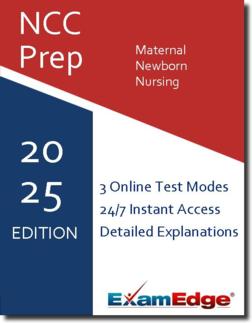NCC Maternal Newborn Nursing (RNC-MNN) Practice Tests & Test Prep by Exam Edge - Additional Information
Based on 22 Reviews
- Real Exam Simulation: Timed questions and matching content build comfort for your NCC Maternal Newborn Nursing test day.
- Instant, 24/7 Access: Web-based NCC Maternal Newborn Nursing practice exams with no software needed.
- Clear Explanations: Step-by-step answers and explanations for your NCC exam to strengthen understanding.
- Boosted Confidence: Reduces anxiety and improves test-taking skills to ace your NCC Maternal Newborn Nursing (RNC-MNN).

NCC Maternal Newborn Nursing - Additional Information
Nurses working with expectant families are among the most important people in the delivery room. Before they can officially enter the workforce, these nurses must first take and pass several certification exams. The National Certification Corporation (NCC) is a not-for-profit organization for nurses and nurse practitioners in women's health, obstetrics, and neonatal nursing specialty areas. It sponsors certification exams for competency validation. The NCC Maternal Newborn Nursing certification, or NCC RNC MNN, is one such exam.
What is the NCC Maternal Newborn Nursing Exam?
NCC developed the RNC MNN certification exam to measure the knowledge, skills, and talents of aspiring obstetrics nurses. The NCC maternal newborn nursing certification helps signify that a candidate is indeed fit for professional practice. Given that this exam is often the last hurdle before launching an exciting new career, aspiring nurses owe it to themselves to take a few NCC MNN practice tests ahead of the real thing.
Who Should Take the NCC Maternal Newborn Nursing Exam?
Only those with active nursing licenses can register for the RNC MNN. Other eligibility requirements include 24 months of specialty experience in the United States or Canada, as well as employment in that specialty area within the last two years. Generally speaking, only those with education and experience in this field should take the MNN-NCC test.
How Much Does the NCC Maternal Newborn Nursing Exam Cost?
The RNC MNN is an excellent investment in your future career. There is a $325 fee to take this exam, including a $50 non-refundable application submission cost and a $275 test fee. Incomplete applications may be subject to additional processing fees. Taking sample NCC MNN tests ahead of the test can help ensure your exam registration money is well spent.
How Many Questions Are on the NCC Maternal Newborn Nursing Exam?
The NCC Maternal Newborn Nursing exam consists of 175 multiple-choice questions. Only 150 questions will count towards your overall score, with 25 questions used as pilot items for future versions of the exam. Examinees are given three hours to answer all the questions, leaving them with just over one minute to address each item. An RNC MNN practice test can help examinees get comfortable with this rapid-fire pace.
Prepare Now for Your NCC Maternal Newborn Nursing Exam
An excellent score on the MNN-NCC can send a clear message to employers that you're both educated and capable of any challenge sent your way. To achieve such a score, though, serious preparation is needed. Incorporate RNC MNN practice tests in your routine – studies have shown that practice exams are one of the most effective forms of study.
A practice exam can highlight content area blindspots you didn't know were an issue. Exam Edge® offers 15 practice tests, each with 100 questions. Practice questions cover topics including:
- Pregnancy, Birth Risk Factors, and Complications
- Maternal Postpartum Assessment, Management, and Education
- Newborn Assessment and Management
- Maternal Postpartum Complications
- Newborn Complications
Use our resources to discover specific areas for improvement. You'll receive a detailed score report with guidance on why you got a particular item wrong. With such a thorough analysis of each question on hand, you can create a customized study guide to follow in the weeks leading up to your test. Try your hand at a free sample practice test now!


